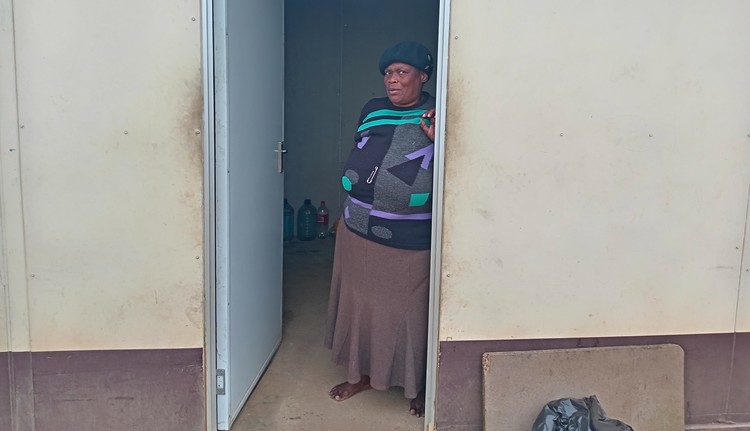These Inanda families have to walk to a primary school to use the toilet
Victims of 2022 floods are still living in a “transit camp”
Mabhuyi Buthelezi, 65, battles to carry buckets of water from trucks to her home in eThekwini municipality’s Congo transit camp. Photos: Tsoanelo Sefoloko
- Families in eThekwini municipality’s Congo transit camp have to walk to a nearby primary school if they want to use a toilet.
- The families were moved to the camp after the deadly 2022 floods.
- There is no running water in the camp, no working sanitation, no electricity, and the only water tank has been empty for some time.
- If the water tanks in the school are also empty, the Congo residents have to bring their own bucket of water to flush the school toilets.
About 250 people are still living in the Congo transit camp in Inanda, eThekwini, two years after floods destroyed their homes. They have no running water, no working toilets, and only illegal electricity connections.
The families, from Nhlungwane, were moved after the April 2022 floods. First, they were sheltered in the community hall, but for two years they have been living in the transit camp, about 47 kilometres from Durban city centre. The camp is built from rhino boards, which are now bent and broken. There is only one water tank which has been empty for some time; and the showers and flush toilets in the ablution block are not working.
Two rooms burned down when residents used candles and other residents had to break the rhino boards to save those inside.
According to community leader Mhlonishwa Luthuli, there are up to 250 people in the camp, including children. He says things were much better in the community hall, where there was water and electricity.
The water tanker used to come twice a week, says Luthuli, to fill the tank which fed the showers and toilets in the ablution block. But the tanker started coming less frequently; the sewerage system got blocked up; the toilets overflowed, and after repeated attempts to fix them, the community decided to lock the toilets.
Now residents who want to use toilets must walk to nearby Sekusile Primary School.
Wendy Mkhize from the school says Sekusile Primary also relies on water tanks, and when these are empty, residents from the transit camps have to bring a bucket of water to flush the school toilets.
Luthuli, whose family survives on a child grant, said he had tried to keep the toilets in use, but it was impossible. “Now I am really tired because the municipality doesn’t want to make the effort to fix the ablution system.”
Thembisile Khanyile lives with her sister and their seven children in two rooms. “My sister used to live in her room before it was burned by the candles. That is when most people decided to accept that we need go for the option of the illegal electricity,” said Khanyile.
When the water tanker does come to Congo, it stops on the edge of the camp.
Mabhuyi Buthelezi, 65, says she battles to walk fast enough with her buckets to get to the water truck 300 metres away. She has to fill two buckets so that she can store water to use at the school toilets.
Gugu Sisilana, spokesperson for the eThekwini municipality, said the City had successfully relocated residents from 29 transit camps into various housing projects, leaving 42 transit camps still to be cleared.
To date, a total of 3,676 families had been relocated. “The plan is to complete the relocation of the remaining transit camps by the end of 2026, but this deadline could be extended due to unavailability of suitable land,” she said.
“The reality is that suitable alternative land is scarce and funding for new houses is severely constrained, limiting construction and allocation of homes,” said Sisilana.
She did not answer our questions about water and toilets.
Support independent journalism
Donate using Payfast

Don't miss out on the latest news
We respect your privacy, and promise we won't spam you.
Next: Appeal court overturns cyber crime ruling
Previous: State completes investigation into three SAPS officers charged with torturing Cape Town barber
© 2024 GroundUp. This article is licensed under a Creative Commons Attribution-NoDerivatives 4.0 International License.
You may republish this article, so long as you credit the authors and GroundUp, and do not change the text. Please include a link back to the original article.
We put an invisible pixel in the article so that we can count traffic to republishers. All analytics tools are solely on our servers. We do not give our logs to any third party. Logs are deleted after two weeks. We do not use any IP address identifying information except to count regional traffic. We are solely interested in counting hits, not tracking users. If you republish, please do not delete the invisible pixel.

